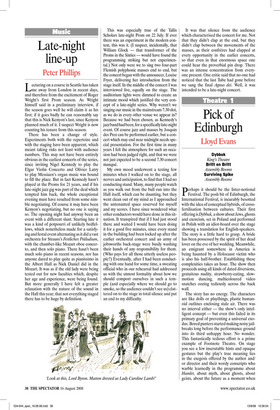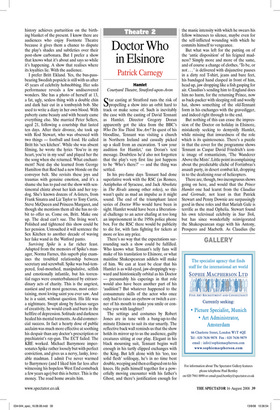Theatre 1
Pick of Edinburgh
Lloyd Evans
Dybbuk King’s Theatre Britt on Britt Assembly Rooms Surviving Spike Assembly Rooms
Perhaps it should be the Inter-notional Festival. The posh bit of Edinburgh, the International Festival, is incurably besotted with the idea of conceptual hybrids, of crossfertilisation between cultures. Their first offering is Dybbuk, a show about Jews, ghosts and exorcism, set in Poland and performed in Polish with an idiot-board over the stage showing a translation for English-speakers. The story is a little hard to grasp. A bride has been possessed by the spirit of her dead lover on the eve of her wedding. Meanwhile, an emigrant somewhere in America is being haunted by a Holocaust victim who is also his half-brother. Establishing these complexities takes an hour. The show then proceeds using all kinds of dated diversions, gratuitous nudity, strawberry-eating, slowmotion dancing, multicoloured video snatches oozing tediously across the back wall.
The story has no energy. The characters are like dolls or playthings, plastic humanoid outlines enclosing stale air. There was no interval either — the show’s only intelligent concept — but even this failed in its primary goal of preventing a universal exodus. Bored punters started making noisy jailbreaks long before the performance ground into its third unhappy hour. No wonder. This fantastically tedious effort is a prime example of Footnote Theatre. On stage you see a few inscrutable hints and opaque gestures but the play’s true meaning lies in the exegesis offered by the author and/ or director and their wordy conscripts who warble learnedly in the programme about Hamlet, about myth, about ghosts, about geists, about the future as a moment when history achieves parturition on the birthing blanket of the present. I know there are audiences who enjoy Footnote Theatre because it gives them a chance to dispute the play’s shades and subtleties over their post-show carbonara. But I prefer a show that knows what it’s about and says so while it’s happening. A show that realises where its loyalties lie. With the audience.
I prefer Britt Ekland. Yes, the bus-passbearing Swedish popsicle is still with us after 45 years of celebrity hobnobbing. Her solo performance reveals a few undiscovered wonders. She has a photo of herself at 13, a fat, ugly, sexless thing with a double chin and dark hair cut in a tomboyish bob. She used to write a diary in her own blood. With puberty came beauty and with beauty came everything else. She married Peter Sellers, aged 21, following a courtship that lasted ten days. After their divorce, she took up with Rod Stewart, who was obsessed with two things — football and food. He called Britt his ‘sex kitchen’. While she was absent filming, he wrote the lyrics ‘You’re in my heart, you’re in my soul’ and played her the the song when she returned. What enchantment! Next day she learned from George Hamilton that Rod had a new blonde on the conveyor belt. She revisits these joys and traumas with genuine emotion, and it’s a shame she has to pad out the show with sentimental chintz about her kids and her toydog. She’s known dozens of A-listers, from Frank Sinatra and Liz Taylor to Tony Curtis, Steve McQueen and Princess Margaret, and though she mentions them all she has no titbit to offer us. Come on, Britt. Make one up. The dead can’t sue. The living won’t. Polished and tightened this show could be her pension. Untouched it will sentence the Sex Kitchen to another decade of waving her fake wand in the Watford panto.
Surviving Spike is a far richer feast. Adapted from the memoirs of Spike’s manager, Norma Farnes, this superb play examines the troubled relationship between secretary and screwball. Spike was bad-tempered, foul-mouthed, manipulative, selfish and emotionally infantile, but his torrential rages were counterbalanced by extraordinary acts of charity. This is the angriest, nastiest and yet most generous, most entertaining, most loving saint you ever saw. And he is a saint, without question. His life was a nightmare. Swept along by furious surges of creativity, he would crash and burn in the hellfire of depression. Solitude and darkness healed his mental torments. As did commercial success. In fact a hearty dose of public acclaim was much more effective at soothing his despair than any doctor’s prescription or psychiatrist’s ray-gun. The ECT failed. The KBE worked. Michael Barrymore impersonates Spike rather loosely but with perfect conviction, and gives us a nervy, lanky, loveable madman. I admit I’ve never warmed to Barrymore (and I liked him far less after witnessing his hopeless West End comeback a few years ago) but this is better. This is the money. The road home awaits him.



























































 Previous page
Previous page